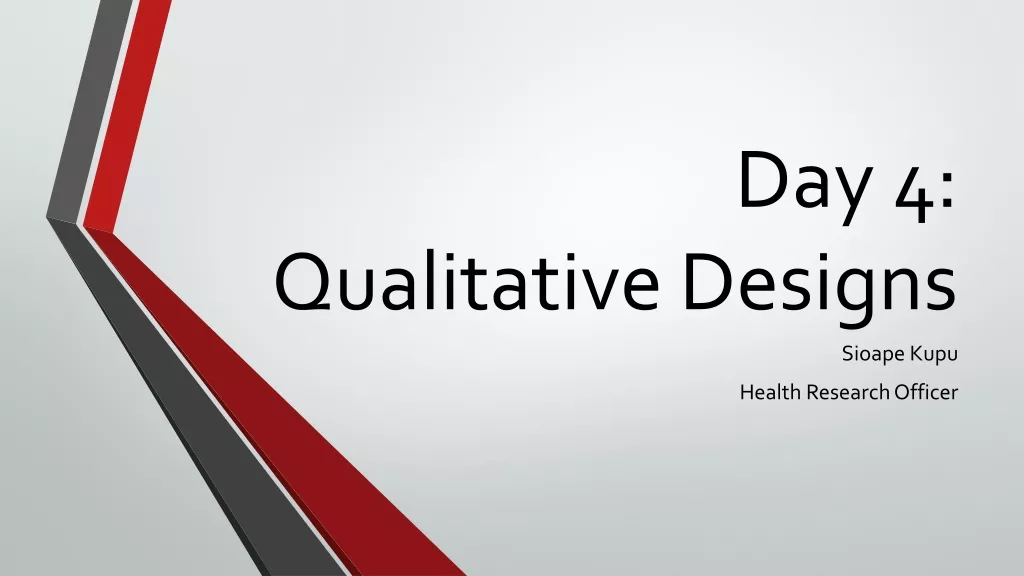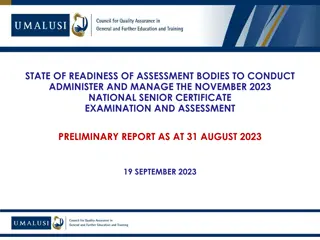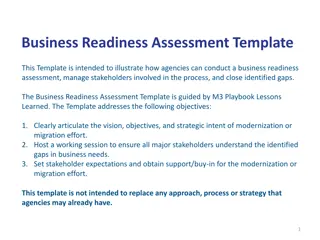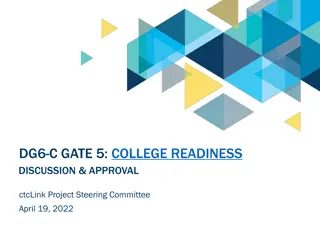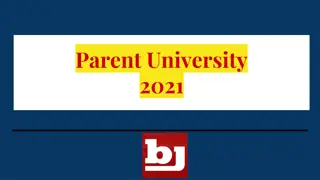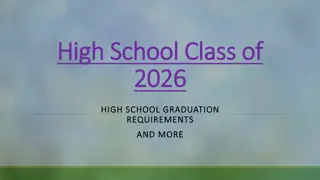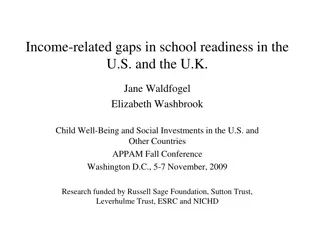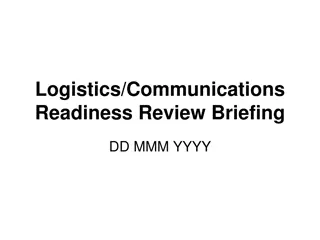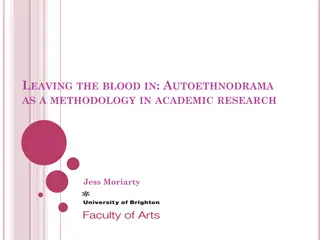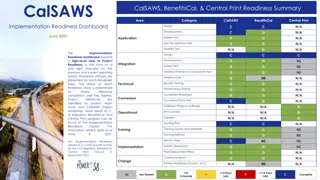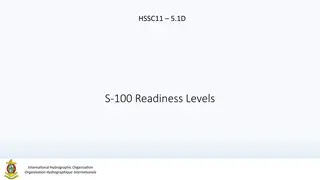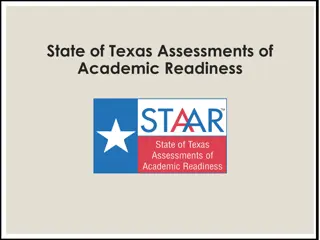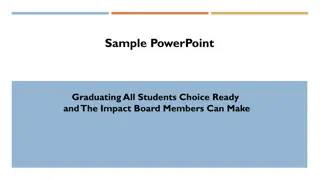Reflections on the 2023 Academic Year and Readiness for 2024
Reflections on the challenges faced during the 2023 academic year, including delays in registration, protests, and funding issues. Universities worked to address concerns with student protests, financial blocks, and accommodation matters. The Department engaged with institutions and student organizations to resolve issues and ensure smooth registration processes. Plans for the upcoming 2024 academic year readiness are highlighted, with a focus on improving registration procedures and addressing student concerns proactively.
Download Presentation

Please find below an Image/Link to download the presentation.
The content on the website is provided AS IS for your information and personal use only. It may not be sold, licensed, or shared on other websites without obtaining consent from the author. Download presentation by click this link. If you encounter any issues during the download, it is possible that the publisher has removed the file from their server.
E N D
Presentation Transcript
2024 2024 ACADEMIC YEAR READINESS ACADEMIC YEAR READINESS PLAN PLAN 8 December 2023 1
Reflections on the 2023 academic year During the registration period, universities are requested to submit their reports on registration to enable the Department to track the registration process in each university and determine areas of concern. The 2023 registration process was impacted by delays in confirming funding for NSFAS- qualifying students and release of grade 12 results. As per the reports received from universities, 11 universities experienced protests at the start of the 2023 academic year. Support, where possible, was provided to universities that encountered challenges. In some cases challenges that lead to protests were related institutional matters, in other instances, sectoral matters. In cases where national intervention is required, the Department engaged with the affected institutions, as well as USAf and student organisations. 3
Reflections on the 2023 academic year Matters raised by students that led to protests and shutdowns included: NSFAS direct payments, not all qualifying students received the allowances; delays on onboarding funded students, pending NSFAS appeals; defunded students, students evicted from off-campus accommodation due to non-payment ( including NSFAS funded students), application of the 60 credits rule accommodation cap and interim accommodation arrangements registration of students with debt These allocations. challenges had an impact on finalization of registration and accommodation 4
Reflections on the 2023 academic year Some universities extended registration period to accommodate the delays caused. Universities were commended for attending to these matters swiftly, most universities had engagements with student leaders to address their concerns. Some universities that experienced protests decided to move registration online not only to protect their communities and properties , also to ensure that registration is not halted. With regards to financial blocks, some universities made concessions that enabled a number of students to register, this may mean that student bad debt will have increased in 2023. Accommodation related matters were attended to including provision of interim accommodation where possible. , 5
Reflections on the 2023 academic year The Department undertook oversight visits to all universities during registration. The first visits to the universities in KwaZulu- Natal, Limpopo and Mpumalanga were linked to the oversight visits of the Portfolio Committee. A monitoring tool was used to assess the activities on the ground to ascertain whether the registration processes at the public universities were proceeding as planned or if a sector approach was required to deal with any matters needing immediate The summary of key issues raised during the meetings include NSFAS related matters:delays in accurately confirming funding for new and continuing students; processing of appeals; exchange of data between institutions and NSFAS for accurate confirmation of funding, confusion about eligibility criteria and progression rules and close out reports. Other concerns related to student debt (self paying students): the implementation of the R45 000 NSFAS cap. Universities indicated that there was insufficient consultation prior the implementation of the cap. 6
2024 Registration Preparations Multi-stakeholder Engagements Monitoring tool used in 2023, will be used in 2024 to monitor registration To ensure stronger accountability, a steering committee consisting of representatives from DHET including the CAS directorate , Universities, NSFAS and student leaders will be established. The Committee will deal with registration related matters including advising on mitigation strategies for potential risks that may affect 2024 registration. The Terms of Reference will be finalised by 08 December. A meeting with Registrars to discuss readiness of universities to start the 2024 Academic year will be held on 05 January 2024. A further meeting with security managers to discuss plans of universities to deal with threats that may arise during registration will be held virtually on 4 January 2024. Ongoing meetings will be organised with USAf and SAUS and other relevant stakeholders as and when necessary. 7
Enrolment planning process and enrolment targets The Department is currently monitoring the universities approved enrolment plans but is awaiting NT letters on budget cuts which are likely to reduce enrolment of NSFAS students in 2024 A report on the 2022 Ministerial enrolment targets is being prepared using audited HEMIS data In January 2024 a report will be submitted for consideration and approval by the Director-General by March 2024 April 2024: the Department will send out enrolment templates for universities to complete 8
Enrolment planning process and enrolment targets In August 2024: Universities will submit preliminary projections for the new enrolment planning cycle September 2024: A national enrolment planning workshop will be held October 2024: There will be one on one meetings with institutions to discuss submitted plans April 2025: Universities are expected to submit Council approved enrolment plans, thereafter estimated teaching input units will be calculated based on plans approved by university Councils In December 2025 the Minister will be provided with a new enrolment plan 9
Update on the comprehensive student funding model ; The Student Funding Model has been tabled before cabinet, and approved. Implementation Plan has been drafted to cover: Continuous engagement with NSFAS Stakeholder Engagement Communication strategy Further engagement with the private sector 10
CAS PROJECT 2024 READINESS Selection template developed and ready 2 institutions have started selections, UL and TUT, selection to be completed by 31 January 2023 for universities . Letters to Registrars will be sent by 08 December 2023 The CACH social media campaign will commence on 15 January 2024 until 31 March 2024. Access credentials for institutions to the CACH system will be sent to institutions by the 19 January 2024. The CACH signup service will be made available for learners to sign up from 26 January 2024 (i.e. 7 days after the release of the grade 12 results) until 31 March 2024. Institutions will access CACH system from 30 January 2024 until 30 October 2024. 11
Hotspots Hotspots are often associated with certain institutions where problems have not been addressed. Accommodation ( accreditation) NSFAS finalising evaluation of applications and issuing funding decisions Direct payments Exchange of registration data ( NSFAS and universities resulting in erroneous funding decisions) Delay on finalising appeals impact Implementation of 60 credit rule by universities and NSFAS It is planned that the Steering Committee on registration matters will deal with these matters, where Ministerial intervention is required , issues will be escalated. 12
UNIVERSITIES READNESS All universities have confirmed that they will complete the 2023 academic year in 2023 as planned. 23 universities received 4 446 436 applications (UNIZULU, WSU, MUT) did not indicate how many applications they received). 2024 FTEN enrolment in the sector approximately 210,000 spaces are available. Registration of returning students will run from 02 January until mid-February 2024 FTENs will commence registration on 15 January 2024 until 15 February 2024. Only 9 universities will allow late applications and walk ins. 8 universities indicated a shortage of accommodation. 13
UNIVERSITIES READNESS Concerns raised by USAf: The capacity of NSFAS to manage student accommodation allocations directly. Outstanding NSFAS matters of 2023 that will roll over to 2024 resulting in demands from students for issues to be resolved (outstanding allowances and appeals). The NSFAS Accommodation cap amount has created debt for students in 2023 and this will impact on their 2024 registration. The impact of NSFAS applications that will only close on 31 January 2024 and the availability of full funded lists during the registration period. Student debt is at about the R16.5+ billion The availability of DHET/NSFAS Guidelines for funding decisions to be made and communicated by NSFAS. 14
NSFAS READNESS Applications opened on 22 November 2023 and will close on 31Jnuary 2024. Upfront Payment to cover Tuition and accommodation allowances will be paid to universities on 31 Jan 2024. Monthly payments will be done at the end of each month, however for Feb- March bi weekly payments will be made. Appeals NSFAS received 192 900 appeals for 2023 academic year, 107 07 applications were withdrawn and 6123 are not yet finalised. NSFAS is still awaiting documents from the applicants. Due to funding short fall NSFAS might not be able to fund students whose appeals were successful in 2023. Given the challenges in processing the appeals that resulted in 2023 appeals not finalised. It is advised that NSFAS finds a better strategy to deal with the appeals. A strategy that will enable processing and consideration of appeals as they receive them. 15
NSFAS READNESS NSFAS reported that University shortfall is projected to be R1,1 billion in the current financial period. The reduction by the 10% over the MTEF period will result in shortfall of a projected R5.5 billion shortfall in the 2024/25 period. It is likely that NSFAS projections are overstated. NSFAS raised a concern regarding the 10% reduction in university funding and indicated that this will result in 87,712 students left unfunded in 2024 academic period and increasing to 120,976 students in the 2025 academic period. UE will triangulate data. Funding guidelines are outstanding NSFAS reported that it has concluded consultations with all relevant stakeholders, June - November 2023 As soon the Board approves the policy ( guidelines) the Minister will be requested to concur with the approval of the Board. It is a concern that the guidelines are not finalised at this stage. NSFAS will be introducing biometric authentication to detect fraudulent applications. This will also be used on receival of registrations by asking students to confirm their institution of study, 16
Mitigation Strategy A War room will be activated to ensure timeous reporting and discussion of challenges experienced during registration, the Branch will communicate outcomes of the monitoring visits The monitoring tool developed will assess registration, readiness for teaching and learning, student academic support, management and stakeholder relations, plans for funding new and returning students, status of institutional finances and challenges. Efforts are being made to engage NSFAS regularly on its challenges, and the Minister has directed NSFAS to update him on its turn - around strategy, further Minister has appointed 2 additional board members to add capacity and experience to the board . 17
Community Colleges: The State of Readiness for the 2024 academic year 08 December 2023 37
PRESENTATION OUTLINE 1. Institutional Landscape 2. Community Colleges Enrolment 3. Community Colleges PQM 4. GETC: ABET Examinations 6. Community Colleges 2024 Readiness Workshops 5. Applications and Registrations 7. Teaching and Learning 8. Governance and Management 7. Budget 9. Funding norms 8. Conclusion
COMMUNITY COLLEGES INSTITUTIONAL LANDSCAPE 20 The Community College Sector has 200 CLCs and 1 591 SCs 225 15 47 11 267 163 125 40 15 7 260 171 80 30 242 15 Community Learning Centres (CLCs) 58 Satellite Centres (SCs)
COMMUNITY COLLEGES - ENROLMENTS 2019 2020 2021 2022 2023 Actual Actual Target Actual Target Actual Target Actual 171 409 142 538 220 549 143 031 266 424 124 738 (Preliminary) 321 841 Data not available Current preliminary enrolment figures for 2022 may not be met, and lower than the 2021 enrolment figures. Colleges have been engaged on the low enrolments and most are citing challenges with the enrolment system. Therefore there is a likelihood of the 2022 enrolment figures changing. In 2023 colleges started with the implementation of the NSF skills and non-formal programmes, therefore there is an expected increase for the 2024 student enrolments.
COMMUNITY COLLEGES - ENROLMENTS 2019 2020 2021 2022 2023 Actual Actual Target Actual Target Actual Target Actual 171 409 142 538 220 549 143 031 266 424 124 738 (Preliminary) 321 841 Data not available Community College 2022 Verified Enrolments 2021 Preliminary Enrolments Eastern Cape 11,592 11,157 Free State 8,644 9,313 Gauteng 67,553 54,155 KwaZulu-Natal 20,609 19,432 Limpopo 9,263 6,511 Mpumalanga 8,361 8,361 North West 7,271 7,271 Northern Cape 1,462 1,462 Western Cape 6,906 6,844 TOTAL 124,738 143,031
COMMUNITY COLLEGES PQM The CET Act 16 of 2006 and the National Policy on Curriculum Development and Implementation in CET Colleges outline the Programmes and Qualifications Mix that CET Colleges should offer as follows: Formal Academic Programmes: General Education and Training Certificate: Adult Basic Education and Training (GETC: ABET) NQF 1. This qualification caters to youth and adults that cannot read and write, to those with education attainment below Grade 9. All the CLCs and SLCs offer this qualification. Senior Certificate at NQF 4. This qualification offers a second chance opportunity to students who want to obtain matric for the first time or improve their matric. DHET has also partnered with DBE to expand their Second Chance Matric Programmes (SCMP) to CET College students. DBE donated electronic learning material as well as hard copies of the study guides for all gateway subjects to CET Colleges. The SCMP online link was also shared with college students for access to online resources. CLCs and SLC are accredited by DBE as examination centres for this qualification. National Senior Certificate (NSC) at NQF 4. Some colleges are also offering rewrite opportunities to students who want to improve their NSC subjects. Tuition and examination are offered in some CLCs.
COMMUNITY COLLEGES PQM Occupational Skills Programmes: CET Colleges are offering occupational skills programmes mainly accredited by different SETAs. The following are some of the SETA-accredited occupational skills programmes offered in CET Colleges: End User Computing-MICTSETA Accredited o Clothing Manufacturing and Sewing -FP&M SETA accredited o New Venture Creation-Services SETA accredited o The QCTO has accredited CET colleges to offer the following occupational skills and are earmarked to be offered in 2023. Computer and Digital Support Assistant o Seamstress o Assistant Baker o Cook Assistant o Basic Furniture upholsterer o Entrepreneurship training in partnership with SEDA. 18 CLCs are piloting entrepreneurship training targeting small business owners or prospective entrepreneurs. 400 College students and community members have been trained and supported by SEDA at these CLCs so far.
COMMUNITY COLLEGES PQM Non-Formal Programmes These are some of the non-credit-bearing programmes that do not lead to a part or full qualification. The following non- formal programmes are offered in CET Colleges: o Driving Licence o Baking o Gardening o Knitting and Crocheting o Beadwork Some of the NSF programmes offered include: 1. Beauty & Nail Technology 2. Welding Workshop Assistant 3. GBV Advocacy, Victim and Mentor Support 4. Community House Builder Level 2 5. Tyre repair and fitment 6. Cell phone repairs 7. 8. 9. 10. Carpentry Skills Programme 11. Electrical Engineering Level 2 12. Learner s Driver s License Community Health Work Early Childhood Development L3 Solar Geyser Installation and Maintenance
GETC: ABET EXAMINATIONS NOVEMBER 2023 GETC: ABET examinations commenced on 01 November and finished on 23 November 2023. 26 Learning Areas were written at over 1,912 examination centres across the country. 55,235 students were registered for the November 2023 exams and 265,810 entries for the 26 Learning Areas The examinations proceeded well, with few challenges in the distribution and delivery of question papers due to delays at the Government Printing Works and challenges with the courier company contracted by DHET to distribute exam material. DHET deployed its Head Office and Regional officials to monitor the writing of this examination.
APPLICATIONS AND REGISTRATION Academic Calendar for 2024 was developed, approved by the DG and distributed to Community Colleges. 96% of Community Colleges use DBE public schools and therefore their calendar is aligned to that of schools. Community Colleges will re-open on 18 January 2024 for both inland and coastal colleges. Registration of students will therefore take place in January 2023 when Community Colleges re-open. There are plans in place to move colleges to process applications and registration during the last quarter of the previous academic year. The Branch is working with Communications to develop messages for learner recruitment for 2024 academic year as well as produce a flyer on opportunities available in CET Colleges. The Department will monitor and support colleges state of readiness visits at the beginning of the 2024 academic year.
COMMUNITY COLLEGES 2024 READINESS WORKSHOPS At the beginning of the 2023 academic year, community colleges were monitored and assessed for improvement for the current year and years to follow. Throughout the year areas of interventions were identified for intervention, focusing on capacity building and optimising resource usage e.g. New Funding Model aimed at equitable distribution of funds. Readiness Workshops conducted focused on: o Curriculum Development and Support o Diversifying Programme Offerings based on Community Needs. o Applications & Registrations o Orientation & career guidance (Student & Community Support Services) o Financing and Funding (Budget Planning) o Availability of LTSM and stationery o Lecturer Development and Support
TEACHING AND LEARNING Teaching and Learning Improvement plans were reviewed in preparation for the 2024 academic year. Programme information and career guidance services and advice will take place during registration. Consolidated register of programmes for offering in 2024 to be distributed to Community Colleges for uploading on college websites and distributed as part of College advocacy during the re-opening of Colleges. Subject Assessment Guidelines have been updated and distributed to Community Colleges in preparation for the 2024 academic year. Last quarter of 2023 academic year used for advocacy and to recruit students into college programmes.
TEACHING AND LEARNING New programme on Civic Education will be introduced at the beginning of the 2024 academic year after piloting by Higher Health. Community Colleges are progressively introducing skills, occupational, Learnerships and non-formal programmes. Funding support is from NSF and SETAs. The revised LTSM catalogue for 2024 was distributed to Community Colleges in September 2023 as part of ensuring the procurement or supplementation of Learning and Teaching Support Materials and stationery for students in 2023. The total allocation for LTSM for all Community Colleges for 2024 is R82.3 million. Community College students receive free LTSM in line with the Norms and Standards for Funding Community Colleges and the National Policy for Learning and Teaching Support Materials. Expansion of Digital Literacy programmes to be undertaken in partnership with NEMISA for Community College lecturers.
GOVERNANCE AND MANAGEMENT The stability and success of operations at Community Colleges is dependent on their governance and management. Governance: All 9 Community Colleges have functional councils in terms of the Continuing Education and Training Act, Act No 16 of 2006. Their term of office ends in October 2025 with the exception of Northern Cape which ends in 2026. Training interventions have been conducted since their appointments and the last capacity building workshop held on 27 and 28 November 2028. There are five Ministerial Appointees college councils vacancies: 1 X Free State, 2 X Mpumalanga, 1 x Northern Cape, 1 X Limpopo and 1 X Eastern Cape. All except Eastern Cape (new vacancy) have been advertised. Management: Out of the 9 Community Colleges, Limpopo and Gauteng Community Colleges have vacancies for the principals post. There are acting incumbents in place. For Limpopo, the post has been advertised.




